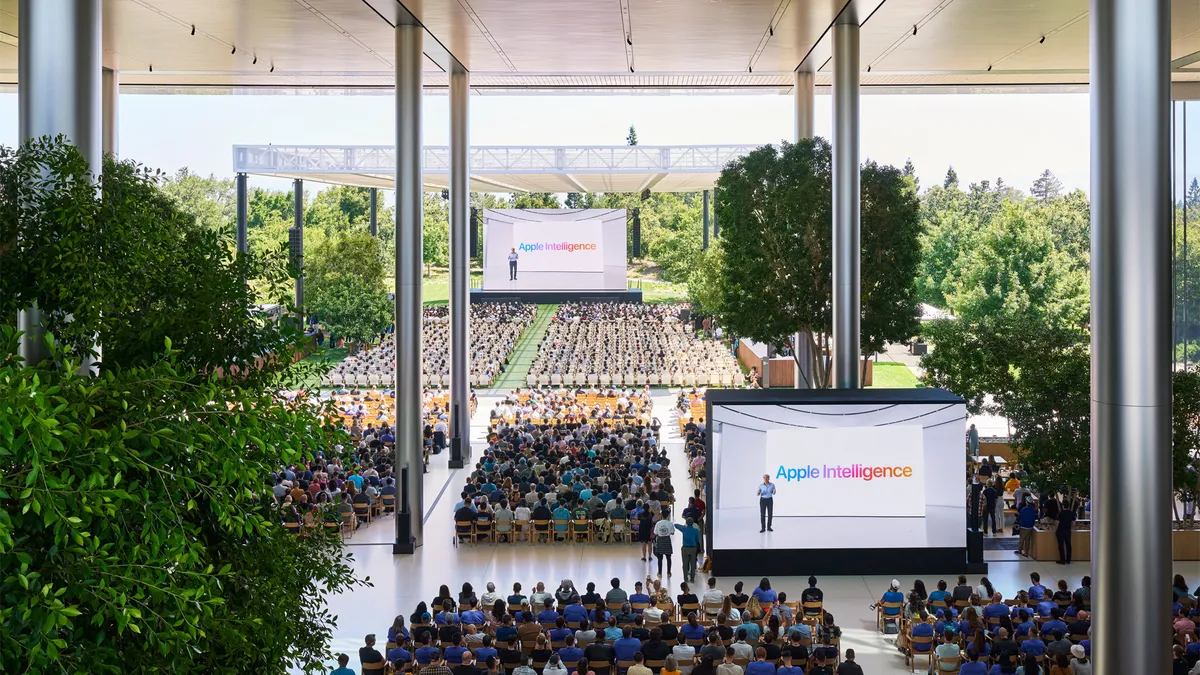Dive Brief:
- Apple unveiled a new generative artificial intelligence (AI) offering called Apple Intelligence during the keynote of its annual Worldwide Developers Conference (WWDC) on Monday. The company also revealed a much-anticipated partnership with OpenAI.
- Apple Intelligence is billed as a personal intelligence system for iPhone, iPad and Mac that joins generative models with personal context to drive relevancy. The offering, which promises to simplify everyday tasks and actions across a variety of apps, was introduced alongside a privacy-focused solution called Private Cloud Compute.
- Apple is also integrating OpenAI’s ChatGPT into experiences within iOS 18, iPadOS 18 and macOS Sequoia, including within offerings like its new Writing Tools and Siri. The integration will be powered by OpenAI’s GPT-4o model and become available later this year.
Dive Insight:
Apple’s annual developer conference is known for its splashy displays of the latest and greatest the tech giant has to offer, including the newest innovations for its iOS software. This year’s event was no different, with presenters spending much of the event’s first-day keynote debuting Apple’s answer to the explosive rise of generative AI with the reveal of an OpenAI partnership and the unveiling of Apple Intelligence. The latter will be available this fall in beta on the latest versions of its operating systems, including iOS 18.
“Apple Intelligence will transform what users can do with our products — and what our products can do for our users,” said Apple chief executive Tim Cook in a statement. “Our unique approach combines generative AI with a user’s personal context to deliver truly helpful intelligence. And it can access that information in a completely private and secure way to help users do the things that matter most to them.”
Apple is searching for its edge in the competitive AI landscape by promoting Apple Intelligence as a more individualized solution compared to other options, capable of understanding “personal context to deliver intelligence that is helpful and relevant.” For instance, in Apple’s Mail app, a new Priority Messages feature at the top of a user’s inbox will highlight more urgent emails, like a boarding pass. Within a user’s inbox they will also be able to see summaries of an email without needing to open a message, and a Smart Reply feature will suggest quick responses.
Apple Intelligence will be integrated into several other Apple features. In the Notes and Phone apps, users will be able to record, transcribe and summarize audio. New Writing Tools within Apple’s latest operating systems will also leverage the tech. For instance, with a Rewrite function, Apple Intelligence will allow users to choose from different versions of what they have written and adjust the tone to suit the task at hand.
Apple is attempting to relieve any consumer privacy concerns around its AI — and maintain its walled-garden status — by designing it to feature on-device processing, with many of the models that power it running entirely on device. For more complex requests, the company introduced Private Cloud Compute, which draws on larger, server-based models that run on servers powered by Apple silicon in order to prevent data from being retained or exposed.
Notably, Apple will bring ChatGPT to experiences within iOS 18, iPadOS 18 and macOS Sequoia later this year as part of a highly anticipated partnership to allow consumers to utilize the tech without having to jump between tools. Within Siri, the virtual assistant can tap into ChatGPT’s expertise when deemed helpful, asking users for permission before any questions are passed along. ChatGPT will also be available in Apple’s Writing Tools to help users generate content for things they’re writing about. Through a Compose tool, users can access ChatGPT image tools to generate images in a swath of styles.
Privacy protections are built in for Apple users who access ChatGPT: OpenAI won’t store requests, and IP addresses are obscured, per press details.
Along with bringing ChatGPT to Siri, the keynote also detailed what is likely the largest overhaul to the virtual assistant to-date, describing the upgrades as its “new era.” Siri will be powered by Apple Intelligence to become more deeply integrated into the system experience, offering richer language-understanding capabilities that make it more natural and contextually relevant. Beyond Siri, the company announced a new Image Playground that leverages Apple Intelligence to allow users to create images within seconds and is accessible in apps like Messages along with its own dedicated app.
Among other announcements, Apple revealed that it will bring rich communication services (RCS) to Messages in iOS 18, a move the tech giant has long resisted, which will make for smoother conversations between iOS and Android devices. The company also announced that it will be bringing the Apple Vision Pro to new countries and a new feature for iOS 18, Messages via satellite, that enables messaging for the times when cellular and Wi-Fi connections aren’t available.















